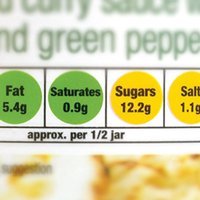
One of the most interesting types of business ownership is that of a co-operative. This is because co-operatives are owned by their members, not by shareholders like private or public limited companies. The largest co-operative in the UK is The Co-operative Group. This has more than three million members. Each member has an equal right to contribute to its decision-making processes. This means that, while managers make the decisions for the business, members rather than shareholders influence behaviour by giving direction to the business. Importantly, they determine the ethical direction of the business.
The Co-operative Group is large and diverse. It has a number of different businesses serving a number of markets. Its businesses range from food, banking and travel to insurance and legal services. It also includes online shopping and funeral directors. The recent acquisition of Somerfield means that The Co-operative Group now has around 3,000 food stores in the UK. Food retailing today accounts for approximately 50% of the total turnover of The Co-operative Group.
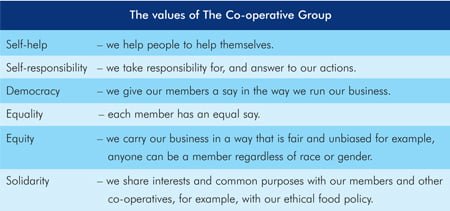
As its members determine the direction of The Co-operative Group, it is the values of the members that drive the business. This is part of the process of corporate governance. Members can influence the decisions and direction. The actions of the managers of the Group are based on these values.
This case study shows how The Co-operative Group’s values contribute to improving the diet and health of the UK. In recent years members of The Co-operative Group have been concerned about its policies in the area of diet and health. One of the actions that came from this has been the reformulation of own-brand products to reduce salt, saturated fat and sugar. Also an increasing part of the food range includes healthy options. Products carry clear and honest labelling. The Co-operative supports initiatives such as the Food Standards Agency’s (FSA) ‘traffic light’ labelling on product packaging. The Co-operative believes customers should have access to high-quality food that is produced and marketed in a way they can trust.
Internal stakeholders
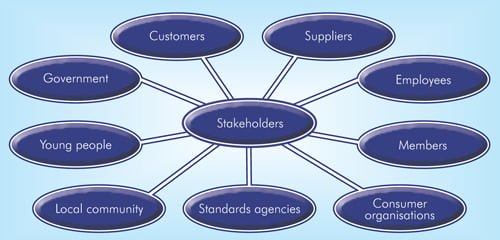
Individuals, groups or organisations may be affected by what an organisation does. They may also have an effect on that organisation. In this way, they are said to have a stake or interest in the decisions an organisation makes. In other words, they are stakeholders. Stakeholders exist both within an organisation as well as outside the business. For example, within a business, internal stakeholders might be employees and managers. Outside the business, external stakeholders may include standards agencies, customers, the government, young people and the local community in which the business operates.
One of the most important internal stakeholder groups for The Co-operative is its employees. The retail food industry depends upon good people delivering good customer service. When employees provide good service to customers, this helps the business retain its customers. If the business does well, this promotes better job security for employees. By treating its staff ethically, The Co-operative hopes to retain employees. One way it has done this has been through its ‘Good with Food’ theme. This involves engaging staff with the core values and principles of the Cooperative brand. Staff then feel they are moving in the same direction. Other initiatives include a training programme that helps employees to improve their skills and product knowledge.
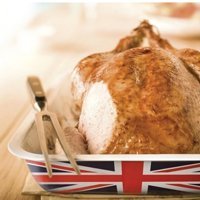
Suppliers may be classed as internal or external stakeholders. This depends upon how closely they work in partnership with the business. For example, by working very closely with its supply chain, The Co-operative has been able to introduce a welfare and quality standard for indoor-reared chicken from UK farms, called the Elmwood standard. This has helped to improve animal welfare without huge additional costs. Also, all Co-operative own-brand fish products are now from sustainable sources. The same high standards have been set whether the fish is fresh, frozen, canned or an ingredient.
For The Co-operative, the members are an important internal stakeholder group. For example, it has an ethical policy on food that is supported by its members. This policy shows that stakeholders affect what organisations do as well as being affected by them.
External stakeholders
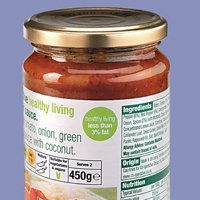
The Co-operative Group has a number of different external stakeholders, including customers, the government and food standards bodies:
- The requirements of customers drive The Co-operative to develop new goods and services. Following consultation with its customers, The Co-operative introduced an honest labelling policy to help customers make informed decisions about the products they buy.
- The government has been trying to highlight the risk of obesity. The Co-operative has supported its Change4life programme by helping to communicate the government’s message.
- Organisations, such as the FSA and the British Farm Standard, have influence in the food industry. For example, The Co-operative has adopted the use of the FSA’s traffic light labelling, helping consumers understand the nutritional content of their food and helping them adopt healthy eating habits.

The Co-operative supports numerous community and sporting activities. For example, it supports a national charity called Street Games. This charity promotes sport to young people who live in disadvantaged communities. The organisation feels that supporting communities is a crucial role that is at the heart of its cooperative heritage.
Young people are important stakeholders as they represent the next generation of members and customers. To help young children understand where their food comes from, The Co-operative supports school visits to its farms across the UK. ‘From Farm to Fork’ is a learning experience for primary school children and by the end of 2009, as many as 30,000 children will have visited farms as part of the scheme.
Dealing with stakeholder conflict
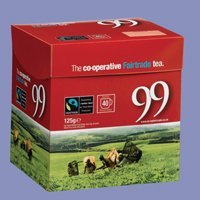
Whenever a business tries to meet the needs of many different stakeholders, there is the potential for stakeholder conflict. This is where different stakeholder groups might have different priorities. For example, the three million members of The Co-operative Group may have different priorities from its ten million customers. Ethical activities may not always be commercially viable.
In these circumstances, managers have to make decisions that some members might not like. It is always important that the reasons for such decisions are communicated to members. This will help them to understand why they have been made. For example, The Co-operative has been switching many of its products to Fairtrade suppliers.
Supporting Fairtrade products is part of The Co-operative’s ethical trading policy. Fairtrade suppliers are promised a price level that helps them to make their businesses sustainable. This helps the suppliers to invest in their businesses. It also ensures they are not damaging their resources for the next generation. Treating this set of stakeholders fairly may be good for suppliers. However, it may mean customers who want low prices have to pay slightly more for some products.
Benefits of being stakeholder-focused

It is not easy to balance all stakeholder requirements. It means the main focus of the business is not just about profitability. Alongside revenue, it needs to consider its impact on people and the environment. The Co-operative is led by its values and the need to behave ethically. Employees also benefit from the business being stakeholder-focused. They will want to continue working for an organisation that has good and fair policies and does the right thing. This is more cost-effective for the business than having to recruit new staff. Consumers and members support organisations that behave ethically. Providing ethically sourced goods enables The Co-operative Group to gain a competitive advantage.
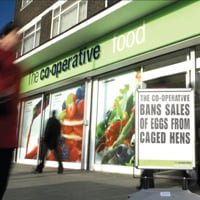
The Co-operative Group works with a number of consumer organisations, pressure groups and charities to meet the needs of its stakeholders. Supporting the values of these groups helps create positive public relations for The Co-operative. For example, The Co-operative leads the challenge against climate change and 99% of its power is sourced from good quality renewable resources. In 2008, The Co-operative received a lifetime achievement award from the RSPCA recognising its achievements in the field of animal welfare. The Co-operative also addresses waste management issues and has a major recycling centre in Manchester. It has also reduced the amount of packaging used for its own-brand food products by 15%.
All of this leads to The Co-operative Group’s development as a sustainable business. By working with government and consumer groups, issues of ethical importance can be targeted. For example:
- certain additives including artificial colours and MSG were removed from its own products from 2005, well ahead of its competitors
- The Co-operative only sells free range and organic eggs.

All of this has helped The Co-operative to represent the ethical views of its members.
Conclusion

The views of the members of The Co-operative influence how the business behaves. It creates a series of values that helps it to behave in an ethical manner. This involves understanding, meeting and balancing the needs of all its stakeholders.
Stakeholders exist both within and outside the organisation. Trying to balance their needs is not always easy. Sometimes there is a conflict of interest in the way a business behaves or in its objectives. However, although conflict may take place, running the business in an ethical way helps The Co-operative Group to be sustainable. It also helps it create a unique position in the marketplace that provides it with a distinct competitive advantage.
